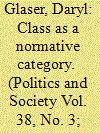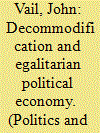|
|
|
Sort Order |
|
|
|
Items / Page
|
|
|
|
|
|
|
| Srl | Item |
| 1 |
ID:
100277


|
|
|
|
|
| Publication |
2010.
|
| Summary/Abstract |
This study revisits the debate on trade reform in Latin America, focusing specifically on what combinations of conditions were necessary and sufficient for very rapid trade liberalization. It departs significantly from two types of studies that have been previously used to examine Latin American trade reform: (1) those using large samples and linear statistics to test the mean effects of variables on levels of trade protection and (2) those isolating necessary conditions for rapid reform but using a small number of case studies. Using fuzzy-set qualitative comparative analysis and short case studies, the study considers trade policy in sixty-one administrations. It finds that a key motivating factor for rapid trade opening is potential resistance from protected industry; it further identifies several other important enabling conditions, such as hyperinflation, devaluation, and an unconstrained executive. In combination, these enabling conditions are sufficient to account for a high percentage of rapid reform episodes.
|
|
|
|
|
|
|
|
|
|
|
|
|
|
|
|
| 2 |
ID:
100273


|
|
|
|
|
| Publication |
2010.
|
| Summary/Abstract |
Race and sex/gender are commonly argued to deserve equal priority with class oppression in egalitarian politics. However, placing race and sex in the same list as what is here termed "standard-of-living class" constitutes a category error. Standard of living, alongside power and status, belongs to a distinctive list of "metrics of hierarchy" that should be accorded priority in an important respect: in the specification of the hierarchies (or "distribution strata") that egalitarians seek ultimately to eliminate or reduce. Race and sex, along with other "differentiators," matter primarily for the way they are "used" by social arrangements (e.g., apartheid, patriarchy, capitalism) to assign persons to places in hierarchies of living standard, power, and status. Examining policies to promote black capitalism in post-apartheid South Africa, the author shows how the conflation of differentiators (race, in this case) and distribution strata (like standard-of-living class) is complicit in justifying multiracialized inequality.
|
|
|
|
|
|
|
|
|
|
|
|
|
|
|
|
| 3 |
ID:
100274


|
|
|
|
|
| Publication |
2010.
|
| Summary/Abstract |
This article contends that decommodification is an appropriate concept for understanding diverse initiatives such as fair trade, microfinance, open source, social enterprises, and the environmental commons as component features of a common process. Decommodification is conceived as any political, social, or cultural process that reduces the scope and influence of the market in everyday life. Given recent transformations in market societies, a more expansive framework for decommodification is urgently required. Decommodification would insulate non-market spheres from market encroachments; increase the provision of public goods and expand social protection; promote democratic control over the market by creating economic circuits grounded in a logic predicated on social needs rather than profit; and undermine market hegemony by revealing the market's true social costs and consequences. By ensuring basic needs, enhancing individual capacities and capabilities, and promoting social cooperation and collaboration, decommodification constitutes a central feature of an egalitarian agenda.
|
|
|
|
|
|
|
|
|
|
|
|
|
|
|
|
| 4 |
ID:
100275


|
|
|
|
|
| Publication |
2010.
|
| Summary/Abstract |
While sociologists and political scientists have become interested in the role of ideas in the political process, relatively little work looks at how ideological claims are actually deployed in political discourse. This article examines the economic claims made in two pairs of Congressional debates over tax cuts, one (in 1962 and 1964) generally associated with Keynesian economic theories, and one (in 1978 and 1981) tied to supply-side ideas. While these bills were indeed initiated by groups subscribing to different economic ideologies, subsequent debates look surprisingly similar. The bills were closer in substance than one might expect, and while their proponents came from opposite political camps, in both cases supporters focused more on supply-side than demand-side effects and emphasized tax cuts' ability to pay for themselves through economic stimulation. The authors propose that politically acceptable economic claims may evolve more slowly than the economic theories that inspire policy entrepreneurs, and that this "discursive opportunity structure" may not only constrain the political process but may potentially shape the political effects of expert knowledge.
|
|
|
|
|
|
|
|
|
|
|
|
|
|
|
|
| 5 |
ID:
100279


|
|
|
|
|
| Publication |
2010.
|
| Summary/Abstract |
This article explores the possibility of resistance under conditions of extreme state power in liberal democracies. It examines the strategies of migrants without legal status who, when threatened with one of the most awesome powers of the liberal state-expulsion-shed their legal identity in order to escape the state's reach. Remarkably, in doing so, they often succeed in preventing the state from exercising its sovereign powers. The article argues that liberal states are uniquely constrained in their dealing with undocumented migrants. Not only are they forced to operate within the constraints of the international legal order-making repatriation contingent on the possession of identity documents-but the liberal state is also constitutionally limited in its exercise of coercion against the individual. The article concludes that it is those individuals who have the weakest claims against the liberal state that are most able to constrain its exercise of sovereignty.
|
|
|
|
|
|
|
|
|
|
|
|
|
|
|
|
|
|
|
|
|